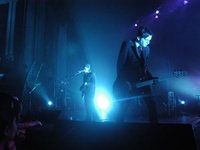As the last song of the concert, “Roland,” another bright light from 2002, wound to an end, blinding white lights flashed the audience like a sea of media cameras. Suddenly the lights dimmed to a hazy red, Carlos and Sam quietly exited the stage and the fate of the only note left standing is in Paul’s hands.
He posed with his back to the audience, leaning over his guitar—finally detached from the mic—he stretched the note to its capacity. The lively crowd melted as he dropped the note, said his last “thank you” and calmly walked off stage, arm-in-arm with Daniel.
Although verbal and physical engagement with the audience was definitely lacking in this tranced-out show, the effect of the band’s raw performance on the audience reveals the true genius of their songs. The key question to ask is: was this massive mishmash of young hipsters, punks, BoBos (Bohemian Bourgeois), and yuppies entertained?
While most fans left the show enchanted, two Kennedy School of Government students felt that the venue didn’t do Interpol justice.
“I thought the sound wasn’t that great,” says Matt W. Landauer. “They were better last time I saw them in a smaller venue.” Intimacy, a feeling craved by all fans, was clearly absent for the mass majority of the audience.
But one fan, Annie M. Lowrey ’06-’07, also a Crimson editor, was lucky enough to catch a little intimate attention in the fourth row. While taking a break from swooning over Daniel Kessler—who Lowrey reasons, “looks like a polar bear but he’s really hot!”—she found her eyes locked with those of Banks, who tossed her a smile when “he caught me singing along with my hands over my heart,” and went on with his blasé beating.
Ultimately, Interpol did not put on a show for the audience in Boston last Wednesday. It was their music—not their own antics—that created the sweetly electrifying and invigorating experience when they turned the bright lights onto the constricted crowd.









